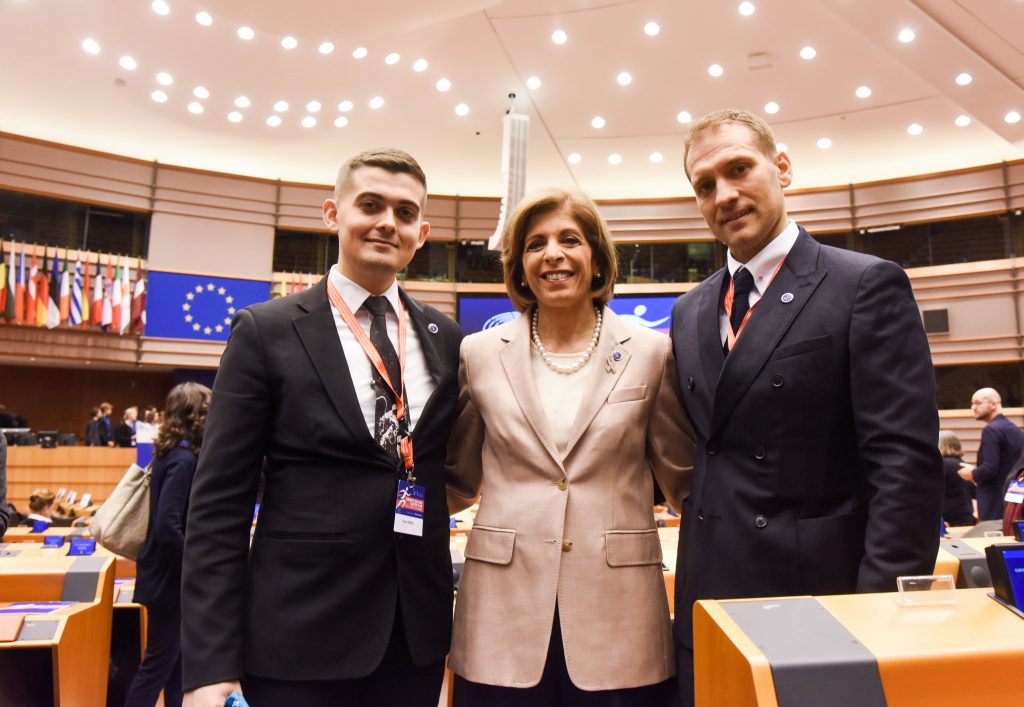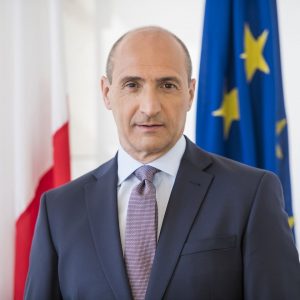In 2018, as many as 3.1 million cancer cases were diagnosed in Europe. This figure is set to reach 3.9 million by 2040. A strategy presented by the European Commission aims to improve the prevention, early detection, therapy and follow-up treatment.
Cancer. A terrible diagnosis both for patients and their families. Cancer affects everyone in one way or another, either through personal illness or when relatives, friends or acquaintances are diagnosed. Although the diagnosis is so common, cancer patients are still frequently stigmatised. In a speech given in early February 2020 introducing “Europe’s Beating Cancer Plan”, European Commissioner for Health and Food Safety Stella Kyriakides therefore stressed: “We need to work towards awareness, prevention, breaking the silence and the stigma.” Stella Kyriakides was a cancer patient herself, having been diagnosed with breast cancer in 1996. Her mother died of the same illness many years ago.

World Cancer Day. Photographer: Jennifer Jacquemart
Credit: European Union, 2020, EC – Audiovisual Service
The term “cancer” refers to a group of over 100 diseases that are characterised by uncontrolled growth and division of cells. The progression and chance of recovery differs according to the type of disease. In 2018, 1.4 million people died of cancer in Europe. This statistic is taken from the Comparator Report on Cancer by the Swedish Institute for Health Economics, in which Europe is defined as the 27 Member States of the European Union, plus the United Kingdom, Iceland and Norway. New and improved therapies are being developed all the time, and consequently over the past two decades the number of cancer deaths has increased at a much slower pace (20 per cent) than cancer cases (50 per cent). In 2018, cancer was newly diagnosed 3.1 million times in Europe.
The risk increases dramatically with age
The most common types in European countries are breast cancer, prostate cancer, colorectal cancer and lung cancer. Cancer affects people of all ages, yet the risk increases dramatically as we grow older. 40 per cent of us are likely to face this disease at some stage of our life. As Europe’s population has an ever increasing proportion of older people, experts estimate that the number of newly diagnosed cancer cases per year in Europe will rise to around 3.9 million by 2040. The new EU initiative aims to counteract this increase while continuing to improve the treatment of cancer patients.

In early February, the new European Commission presented a roadmap that outlines the proposed contents of this strategy. Besides the main focus on prevention, other measures will include vaccinations as well as the reduction of alcohol and tobacco consumption, and also measures to facilitate a healthy lifestyle with a balanced diet and sufficient exercise. The Comparator Report on Cancer reveals that around 40 to 45 per cent of all cancer cases are “estimated to be preventable”. Early detection and diagnosis, and also therapy, follow-up treatment and psychosocial treatment, are other important spheres of activity. “Europe’s Beating Cancer Plan” aims not least to contribute to greater quality of life for cancer patients, survivors and carers. “This strategy by the new European Commission addresses all areas in a holistic way,” emphasises Nathalie Moll, Director General of the European Federation of Pharmaceutical Industries and Associations (EFPIA) and presenter of the “Europe’s Beating Cancer Plan” session at the European Health Forum Gastein (EHFG) 2020.
Europe’s Beating Cancer Plan” addresses all areas in a holistic way.
NATALIE MOLL, DIRECTOR GENERAL OF THE EUROPEAN FEDERATION OF PHARMACEUTICAL INDUSTRIES AND ASSOCIATIONS
Supplementing and strengthening national plans
The European strategy aims to supplement and strengthen existing national plans for fighting cancer in the Member States of the European Union. In a public consultation until 21 May, the European Commission invited all interested persons and organisations to contribute by communicating their opinions and experience. Just over 2,000 public authorities, academic and research institutions, non-governmental organisations, companies and EU citizens took advantage of this opportunity. The feedback compiled will be incorporated into “Europe’s Beating Cancer Plan”, which the European Commission plans to adopt by the end of 2020. According to EU Commissioner for Health Stella Kyriakides, this time schedule will still go ahead despite the COVID-19 pandemic, as reported by the German medical publication “Ärztezeitung” at the end of August.
One focus will be on reducing the major differences between and within the EU Member States in the fight against cancer.
- For example, according to a study performed by the EU statistical office Eurostat, in Romania only 0.2 per cent of women aged 50-69 were screened for breast cancer using mammography. In Denmark, as many as 82.1 per cent attended a screening, which is the largest number in Europe.
- In Iceland, roughly 70 per cent of colon cancer patients live for at least five years after their diagnosis, whereas this figure is only at around 50 per cent in Croatia.
- There is also a disparity in the average waiting period until cancer medication is made available to patients following approval by the European Medicines Agency. The average waiting period ranges between 35 days in Germany and 981 days in Latvia. This difference was revealed by the Patients W.A.I.T. Indicator for 2015 to 2018, commissioned by EFPIA.
Expenditure for cancer medication has doubled
The number of effective medicines available to cancer patients also differs greatly in Europe and is relatively small specifically in Eastern European countries. Some experts believe this is because the medicine is simply unaffordable. Novel medicines with countless newly identified molecular targets or those that activate the body’s own immune system to attack the tumour are very expensive. Some cost several hundred thousand euros, yet not all of them actually bring the patients additional benefits. Nevertheless, the total expenditure on cancer medicines in Europe doubled from 14.6 billion euros in 2008 to 32.0 billion euros in 2018. The total direct costs for cancer treatments in Europe have also increased over recent years, although not more than the overall increase in health expenditure. In 2018, the costs amounted to 103 billion euros. Around 4 to 7 per cent of total health expenditure is usually spent on cancer.
“This suggests that the new cancer therapies, which are frequently administered in outpatient clinics, can save costs elsewhere in the health system – specifically in relatively expensive inpatient treatment,” argues Nathalie Moll. Nonetheless, the EFPIA Director General believes that novel pricing and payment models must be considered in connection with innovative cancer medication. She mentions one example in this context: “For instance, payment of costs by the health insurance funds could be based on the ultimate success of the therapy.”
Greater price transparency is necessary

“In future, we also need greater transparency with regard to the prices paid by countries to manufacturers for the individual medicines. This applies specifically to cancer drugs and to medicine as a whole,” says Christopher Fearne, Deputy Prime Minister and Minister for Health of the Republic of Malta and speaker at EHFG 2020. The Valletta Group, which was established in 2017 during Malta’s EU Council Presidency, has made the same demand. Ireland, Portugal, Spain, Italy, Cyprus, Greece, Slovenia, Croatia and Romania are the other members of the Group. Currently, medicine contracts between pharmaceutical companies and individual countries do not allow the purchasing authorities to divulge the prices they are paying. The Valletta Group technical committee therefore intends to develop ways in which pricing information can be made available to the Union’s Member States. “We have discovered that the prices range between 15,000 and 100,000 euros for exactly the same medication even within our Group,” explains Christopher Fearne.
We need greater transparency with regard to the prices paid by countries to manufacturers.
CHRISTOPHER FEARNE, DEPUTY PRIME MINISTER AND MINISTER OF HEALTH OF THE REPUBLIC OF MALTA
Malta’s Health Minister adds that better price transparency for therapies is only one important starting point for reducing the inequalities within and between EU Member States with regard to cancer. Increased prevention is another important area, and it is comparatively inexpensive. In addition, knowledge exchange between European countries within the European Reference Networks for complex or rare diseases, also established in 2017, can make a considerable contribution to better treatment of cancer patients, says Christopher Fearne. He emphasises: “Although, or precisely because there is currently such a strong focus on the COVID-19 pandemic, we cannot be allowed to forget our other health issues. Cancer is among the most pressing problems in European countries, alongside antimicrobial resistance. We must therefore work together to ensure that Europe’s Beating Cancer Plan continues to be developed and implemented as planned.”
